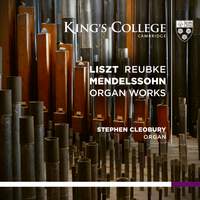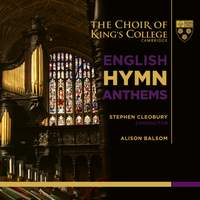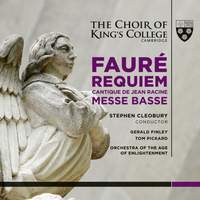Interview,
Liszt, Reubke and Mendelssohn from Stephen Cleobury
 Stephen Cleobury's name is well-known to many as the choirmaster of King's College Cambridge, one of the most successful and frequently-heard choirs in the world.
Stephen Cleobury's name is well-known to many as the choirmaster of King's College Cambridge, one of the most successful and frequently-heard choirs in the world.
For his latest album, though, he has given the boys and men of King's a holiday, focusing on the organ itself with three hefty works - Liszt's Fantasia and Fugue on 'Ad nos, ad salutarem undam', Reubke's Sonata on the 94th Psalm, and Mendelssohn's Sonata No. 6.
I asked Dr Cleobury about this unusual change of direction, and about the relationship between the three works he's chosen to perform.
King’s College is associated worldwide with the pinnacle of the English choral tradition – a fine tradition of which we are all very fond, but one in which the organist’s role is usually relatively minor. This new disc puts the spotlight firmly on both the instrument and the player; would you admit to a slight twinge of pride at the change of emphasis…?
In organists' circles the Harrison and Harrison organ in King's chapel is very widely known and admired, many regarding it as one of the finest examples of the English Romantic organ. It is certainly incomparable as an instrument for accompanying the Anglican choral repertoire, even if it is not quite so well known as a solo instrument. Nevertheless, it has nurtured many fine organ recitalists who studied at the college as Organ Scholar, Simon Preston being a notable example. He made recordings on the King's organ in his student days.
Liszt isn’t one of the major names that springs to mind when the organ is mentioned, yet he was just as at home writing for it as he was for the piano, and his organ works show a similar breadth of scale to his wide-ranging piano fantasias. Why do you think Liszt the organist has languished for so long in the shadow of Liszt the pianist?
Among organists I think that Liszt is very highly prized as one of the leading composers for the instrument in the second half of the 20th century. His piano output is clearly larger and more widely known among the musical public as a whole.
The mighty Reubke Sonata has been described by some as a symphonic poem, and its sections certainly follow the text of the 94th Psalm on which it is based. Programmatic organ music is by all accounts fairly rare; do you find yourself taking a different approach to works such as this where there is definite imagery to be evoked?
I hope that my account of this great sonata reflects the dramatic verses of Psalm 94 which inspired it, but I feel with all programmatic music that the composition must stand on its own feet musically without reference to the programme; this one certainly does that.
The Liszt and Reubke works form a kind of pair, with many musicologists considering the latter to have been inspired by the former. But what about the Mendelssohn? Does his Sonata have a connection to the other works on the disc?
In the sense that one main theme permeates the entire sonata (here the chorale 'Vater unser'), yes. But, of course, the Mendelssohn is much more Classical, and, in its use of a Lutheran chorale makes the all important link back to Bach.
Given that you’re overhauling the organ next year, why pick 2015 to strike out in a new direction with an organ solo album?
The idea of the album was conceived before the restoration and repair work was planned, and it is good to have made this recording before the organ goes out of action for the first 9 months of 2016.
Stephen Cleobury's new organ disc is released today on the College's own label, and is also available to download.
Available Formats: SACD, MP3, FLAC, Hi-Res FLAC
Other albums from King's College
The Anglican hymn-anthem is a staple of the kind of repertoire King's know best, and this delightful selection including Stanford's O for a closer walk and Bairstow's Blessed City shows them at the height of their musicianship.
Available Formats: SACD, MP3, FLAC, Hi-Res FLAC
An authentically-inspired Requiem breathes new life into a well-loved and time-honoured classic, with Gerald Finley the baritone soloist. The Messe Basse for upper voices also gives the trebles a chance to shine.
Available Formats: SACD, MP3, FLAC, Hi-Res FLAC





